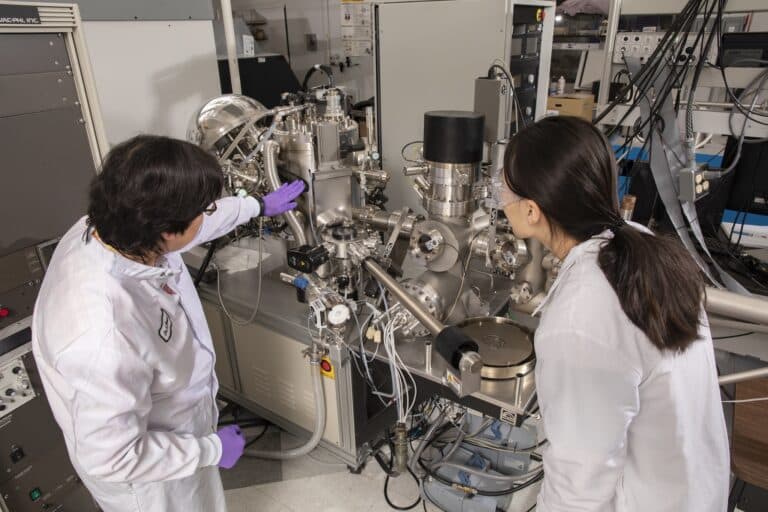
Today’s engineers stand at the forefront of complex challenges, from tackling climate change to revolutionising healthcare. The demand for compassionate and forward-thinking problem solvers has never been higher. To truly make your mark, a graduate degree in engineering can unlock your full potential and empower you to drive meaningful change.
With the engineering field becoming increasingly competitive, acquiring advanced credentials has become a strategic move for many. Studies show that a master’s degree keeps your skills relevant and equips you to address not only present industry challenges but also those on the horizon. In essence, it transforms you into an asset to any team or company. Ready to make a mark in your career and in the industry? Start by considering one of these three US universities’ postgraduate offerings:
Binghamton University
Binghamton University‘s Thomas J. Watson College of Engineering and Applied Science is a vibrant hub for aspiring engineers and computer scientists seeking a path to fulfilling and lucrative careers. As many as 93% of the class of 2022 had a job in their field within six months with an average starting salary of over US$95,000. For a shot at this kind of success, an out-of-state or international student need only invest less than US$34,000 for 30 credit hours, based on current rates. The cost of living is low too, averaging US$11,400 based on a recent survey of current graduate students.
Such figures make for a very strong return on investment — and that’s not counting all the other benefits of studying here. The university is an R1 institution, recognised for its “very high research activity.” Innovative researchers and supportive professors — including the likes of Nobel laureate M. Stanley Whittingham — integrate research into their graduate programmes.
For the MS in Biomedical Engineering, you can tailor courses and work with mentors, enabling you to engage in creative and independent research on a cutting-edge research topic. This prepares you for careers in industry, academia or research. The MS in Electrical and Computer Engineering blends theory and practical know-how and culminates with a thesis or project report, preparing students for careers in industry or a PhD.
The Biomedical Engineering faculty stands out for its research areas and laboratory facilities and increased female participation. Those from non-mechanical engineering backgrounds can pursue a pathway programme to qualify for the MS programme. Apply to these high-ROI MS programmes today.
University of California, Berkeley

Berkeley’s engineering graduate programme ranks third nationally in US News & World Report, with most departments in the top three. Source: University of California, Berkeley/Facebook
Ranked among the top three engineering schools in the world, and offering a dynamic, interdisciplinary, hands-on education, UC Berkeley is the place to be. “Engineering drives innovation that shapes our future. At Berkeley, we work together to ensure that it will be right for all,” says Dean Tsu-Jae King Liu.
Programmes here are designed with insights from the university’s industry partners to address the needs of engineers. From programmes in Mechanical Engineering to Electrical Engineering and Computer Science, Berkeley Engineering offers innovative, impactful ways to change the world. Learning extends beyond technical expertise. Students engage in a rigorous, globally aware education that cultivates critical thinking and problem-solving within state-of-the-art facilities and labs.
The Mechanical Engineering department has graduate programmes like the MEng, MS/PhD, and PhD. Each is an opportunity to become an expert in areas such as energy production, system design control, robotics, miniaturisation, and sustainable solutions, among others.
Future leaders seeking to understand the technical, economic, and social landscape of applied science can consider the Master of Engineering. The one-year programme integrates engineering coursework with leadership and core management concepts. You’ll tackle real-world industry challenges through case studies and a capstone project, preparing you to make an immediate impact.
The best part? You’ll complete the programme alongside world-renowned faculty — Nobel laureates, Fields medal winners and MacArthur fellows — who become your mentors, guiding your journey towards groundbreaking discoveries. Gain invaluable research and teaching experience under their guidance in cutting-edge classrooms, studios, and labs.
Texas A&M University

Texas A&M University’s students, faculty, and alumni are shaping the world through technologies developed in their research programmes. Source: Texas A&M University/Facebook
As the state’s first public institution of higher learning, Texas A&M University is a research-intensive institution in the heart of the Houston-Dallas-Austin triangle. Over 71,000 students pursue an education here, and for good reasons: affordable tuition fees, excellent campus life, valuable education and some of the best faculties in the world. The best part? The university strives to continuously improve in all kinds of ways.
Step into its College of Engineering, and you’ll discover that the sentiment is especially true. With more than 22,500 students enrolled in 15 departments, the College of Engineering is the largest college on campus and is consistently ranked by US News & World Report among the nation’s top public undergraduate and graduate engineering programmes.
The college offers several graduate programmes (MS, MEng, and PhD) across multiple departments, including biomedical engineering, electrical and computer engineering, mechanical engineering, and more. For instance, the Department of Biomedical Engineering fosters future healthcare leaders by focusing on groundbreaking research in areas like imaging technologies, medical devices, and regenerative medicine. Collaborations with renowned institutions and experts pave the way for revolutionary advancements in healthcare.
For those passionate about electronics and computing, the Department of Electrical and Computer Engineering offers many options, from analogue and mixed-signal to photonics and nano-engineering. Programmes are supported by state-of-the-art laboratories and powerful computing facilities. Research opportunities abound, spanning telecommunications, solid-state electronics, and computer vision, preparing graduates for impactful careers.
Over at the Department of Mechanical Engineering, students are mastering the tools to tackle complex mechanical challenges in active research facilities for fields like robotics, artificial intelligence, and advanced manufacturing. Programmes make good use of these facilities, taking a hands-on approach that equips students with plenty of experiences before graduating.
*Some of the institutions featured in this article are commercial partners of Study International










